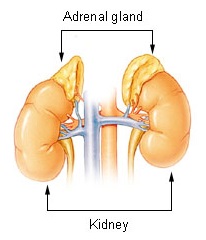Your adrenal glands are each no bigger than a walnut and weigh less than a grape, yet are responsible for one of the most important functions in your body; managing stress.
So what happens to you body when you are under constant stress for a long period of time? Your adrenal glands can no longer keep up and well…they simply get tired. What does that mean for you? Adrenal fatigue arises when your adrenal glands cannot meet the demands of stress, chronic unrelenting stress. Whether you have an emotional crisis such as the death of a loved one, a physical crisis such as major surgery or accident, or any type of severe repeated or constant stress in your life, your adrenals have to respond to the stress and maintain homeostasis. If their response is inadequate, you enter into what is termed adrenal fatigue, in it’s various stages.
It’s estimated that up to 80% of adults experience adrenal fatigue during their lifetimes, yet it remains one of the most under-diagnosed illnesses in the United States.
As part of your endocrine system, your adrenal glands secrete more than 50 hormones, many of which are essential for life and include:
- Glucocorticoids. These hormones, which include cortisol, help your body convert food into energy, normalize blood sugar, respond to stress and maintain your immune system’s inflammatory response.
- Mineralocorticoids. These hormones, which include aldosterone, help keep your blood pressure and blood volume normal by maintaining a proper balance of sodium, potassium and water in your body.
- Adrenaline. This hormone increases your heart rate and controls blood flow to your muscles and brain, along with helping with the conversion of glycogen to glucose in your liver. (Endocrine Web)
These hormones in these tiny little glands work together to perform many functions including:
- Maintaining metabolic processes, such as managing blood sugar levels and regulating inflammation
- Regulating your body’s balance of salt and water
- Controlling your “fight or flight” response to stress
- Maintaining pregnancy
- Initiating and controlling sexual maturation during childhood and puberty
- Producing sex steroids such as estrogen and testosterone
When we are under constant stress of face a major life event our flight or fight is constantly turned on. Our body no longer recognizes how to turn it off and as a result cortisol floods our body at high rates all day long. (Stage 1) This can only go on for so long before the glands totally poop out and cortisol plummets (Stage 2/3)
So what are some signs and symptoms of adrenal insufficiency or adrenal fatigue? (You may exhibit some but not all of the following):
- Tendency to gain weight around the middle, difficult to lose
- High frequency of getting the flu and other respiratory diseases and these symptoms tend to last longer than usual
- Tendency to tremble when under pressure and feel shaky inside
- Loss of libido
- Lightheaded when rising from a horizontal position or standing up to quickly from seated position
- Unable to remember things/brain fog
- Lack of energy in the mornings and in the afternoon between 3 to 5 pm.
- May temporarily feel better after a meal
- Need coffee/caffeine to get going in the morning.
- Cravings for salty, fatty, and high protein food such as meat and cheese.
- Strong PMS symptoms (AF symptoms also increase during PMS)
- Feels better when stress is relieved, such as on a vacation.
- Muscle pain, weakness, and fatigue
- Decreased ability to handle any amount of stress
- Depression
- Hypoglycemia
- Heart Palpitations
- Low body temperature
- Gut issues
- Nervousness
(Find information like this and more at Stopthethyroidmadness.com)
This can all be very overwhelming. If some of these symptoms sounds like what you might be dealing with, I recommend contacting an ND, integrative, or functional medicine doctor. It is difficult to list out what you can to to heal because every stage of adrenal fatigue benefits from different supplements.
There are a two things that I can share….sleep, A LOT……and reduce stress.
We need sleep to heal, to restore and help our adrenals rest and rejuvenate. 8 hours or more is optimal when you are suffering from adrenal fatigue.
Our ability to handle stress, physical or emotional, is a cornerstone to human survival. Therefore, the one thing that is consistent to healing is stress reduction. Changing your thought process and taking care of #1…you.
A few other tips:
- Eat healthy
- Avoid caffeine and alcohol
- Add a small pinch of sea salt to your water
- Eat food plentiful in vitamin C
- Magnesium before bed can help get you a good night sleep.>>This is the one I use
- Include probiotics in your daily diet as well as digestive enzymes
- Anti-Inflammatory herbs such as turmeric and ginger help with chronic inflammation
Here are a couple of links to other blogs that I have written in regards to stress reduction, relaxation and techniques to help get through rough situations. (see a theme here?)
EFT-Emotional Freedom Technique
Here are a couple of great books that I have read and recommend to you:
Adrenal Fatigue: The 21st Century Stress Syndrome
Adrenal Fatigue Syndrome-Reclaim Your Energy and Vitality with Clinically Proven Natural Programs
References
http://www.endocrineweb.com/endocrinology/overview-adrenal-glands
http://www.stopthethyroidmadness.com/adrenal-info/
Please note that I am not a medical practitioner. The content of this website is provided for general informational purposes only and is not intended as, nor should it be considered a substitute for, professional medical advice. Do not use the information on this website for diagnosing or treating any medical or health condition. If you have or suspect you have a medical problem, promptly contact your professional healthcare provider. By using this website, you assume full responsibility and liability for your own actions.







